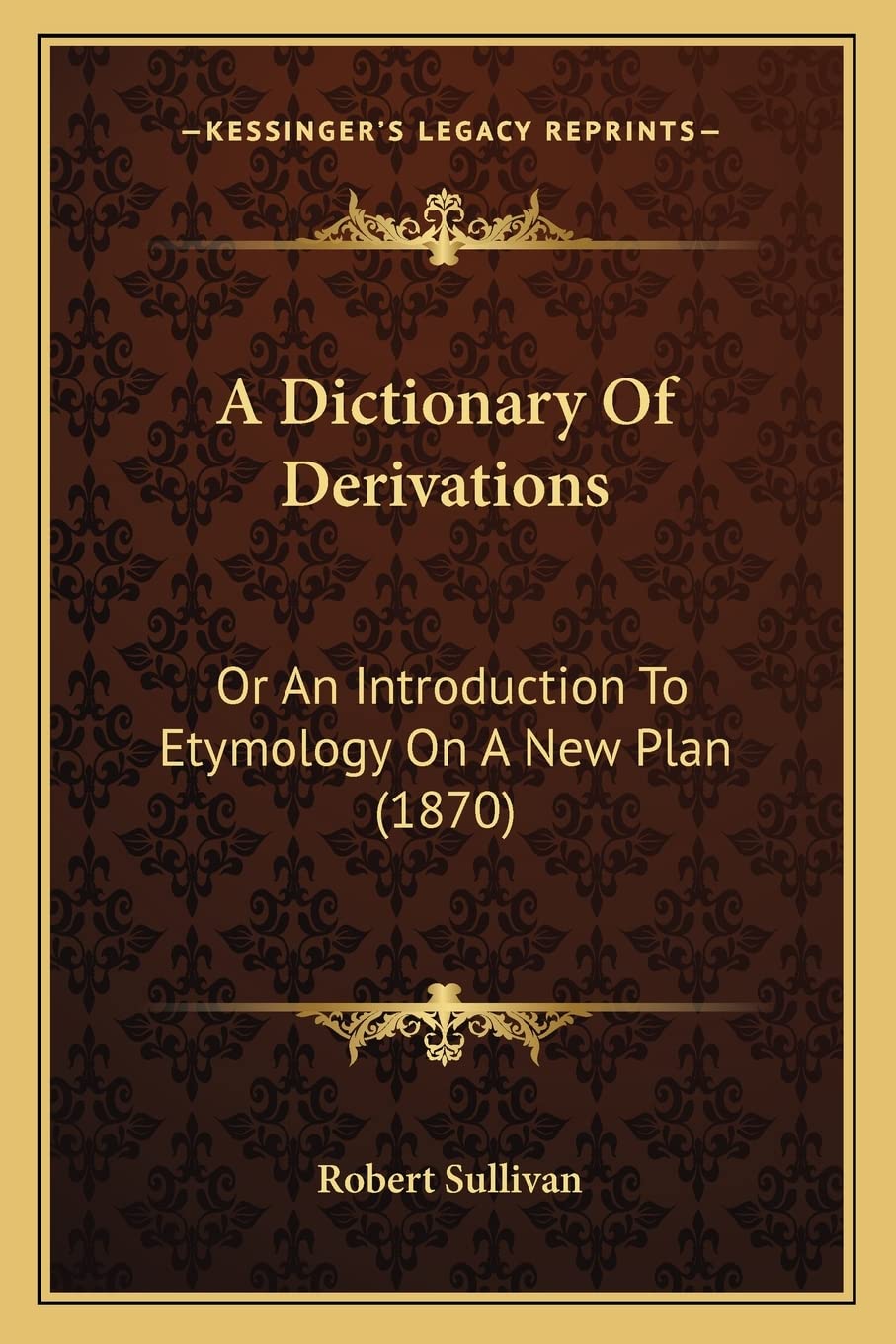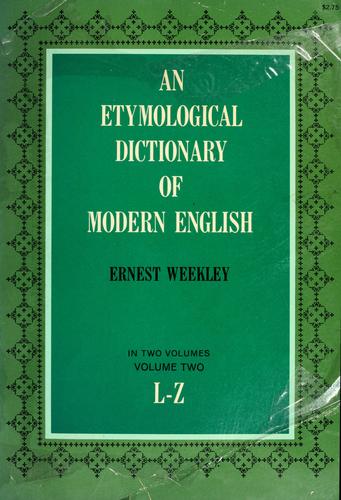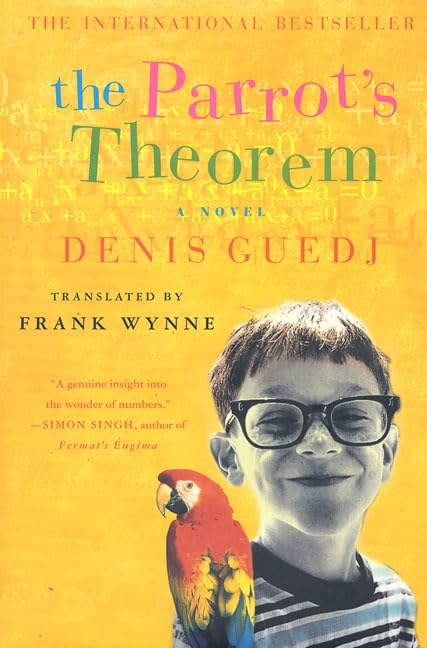Blog
Comedy Extracts
The Word "Etymology" Through History
1823 - John Horne Tooke, radical politician (1736-1812) and the "father of rational philology," established his reputation with the publication of his principal work, "The Diversions of Purley." Originally planned as a three-volume work, this early attempt at a scientific language study was extremely popular and much admired by James Mill and the utilitarians for its philological approach to language and grammar. "It is a trifling Etymology that barely refers us to some word in another language, either the same or similar; unless the meaning of the word and cause of its imposition can be discovered by such a reference."
Mr. Horne Tooke puts forward the question: "When two different languages have the same words, how are we to ascertain which of them borrowed from the other?"
1870 - In A Dictionary of Derivations, Robert Sullivan, LL.D, T.C.D. responds, "This is not a very satisfactory mode of putting the question, for two languages might have the same words without either borrowing from the other, as both might have derived them from a common origin." But his manner of replying to the question is still less satisfactory: Etymology is to decide.

1892 - Rev. Walter W. Skeat, Litt.D. LL.D. in Principles of English Etymology establishes chronology as the best way to determine derivation. "Etymology requires scientific treatment, and does not consist in giving indolent credence to silly guesses; and we at once establish the value of chronology as a helpful guide to the truth."
1904 – Folk etymologies have begun to make up derivations of words that simply are not true. Abram Smythe Palmer, D.D., begins the assault on fake history with his preface to, The Folk and Their Word-Lore, An Essay on Popular Etymologies: "In this little book I draw attention to a curious and interesting subject which has hardly yet received the consideration it deserves, the corrupting influence exercised upon the English language by the people who speak it."
1908 - "I have called it 'significant' etymology, because only those roots are given - which throw light upon the signification of the words derived from them." James Mitchell, Significant Etymology or Roots, Stems, and Branches of the English Language, February
1921 - Etymology was defined in 1921 as a broader approach: Orig. used of the true, literal sense of a word according to its derivation. The word "etymology" is used here in a wider, if shallower, sense than in previous etymological dictionaries. These usually limit themselves to answering the question "Whence?" It always seems to the author that the living word is of more interest than its protoplasm, and that "Whence?" is only part of the problem, the real solution of which involves also answering the questions "How?" "When?" "Why?" and even, occasionally, "Who?"... I am aware that all this is not usually regarded as etymology, but I see no reason what it should not be." - An Etymologyical Dictionary of Modern English by Ernest Weekley, M.A.

1949 - O.H. Perry Pepper, M.D. turns the focus onto Greek and Latin in medical terminology, presumably preparing for the MCAT study guides of the end of the 20th century: "Despite all the study that has been given to the subject of medical terminology, there are many medical terms whose derivation is still uncertain. Most of these are, as might be expected, anatomical terms, for these terms are the oldest. Many of them date back more than two thousand years, and it is not surprising that such ancient words may lack a birth certificate." - Medical Etymology
1957 - “When we are disputing about the proper meaning to be attached to a particular word in a sentence, etymology is of little use. Only children run to the dictionary to settle an argument. But if we would consider the nature of meaning and the relation between thought and things, we cannot profitably dispense with etymology. It is long since men gave up the notion that the variety of natural species and the secrets of their relation to each other can be understood apart from their history;
but many thinkers still seek to confine the science of language, as the Linnaeans once confined botany, within a sort of network of timeless abstractions.
Method, for them, is another name for classification; but that is a blind alley.” ― Owen Barfield, Saving the Appearances: A Study in Idolatry
1986 - "Folk etymology is the attempt to make unfamiliar words resemble better-known words to which they are erroneously thought to be related, and it arises from ignorance of the true derivations of these words." - English Words from Latin and Greek Elements. By Donald M. Ayers
1988 - “Names, once they are in common use, quickly become mere sounds, their etymology being buried, like so many of the earth’s marvels, beneath the dust of habit.” - Salman Rushdie, Booker Prize-winning British Indian novelist and essayist, The Satanic Verses
2002 - “Where would you be without etymology?' Lea asked sarcastically. 'I think I might find words a little less interesting,' said Mr Ruche.” ― Denis Guedj, The Parrot's Theorem

2014 - “The poet doesn’t know what the poem, finally, will be 'about' when he uses the word’s etymology as a starting point before he knows the twists and turns of its history. For example, when I decided to write about vanilla as part of a series of poems about food, I researched its etymology, discovering that it comes from the Spanish vainilla, diminutive of the Latin vagina (“sheath”). Thus, the pod-shaped bean was named after the vagina.” ― Natasha Sajé, Windows and Doors: A Poet Reads Literary Theory
2015 - “Etymology” is from the Greek and means the study (logia) of the “literal meaning of a word according to its origin” (etymon).... It can be a huge help in spelling. For instance, people sometimes misspell “iridescent.”... Rather than just try to memorize the spelling, if you look at the etymology —
study the entrails of the word
— you find that “iris, irid” is a combining form that comes from the Greek Iris, the goddess of the rainbow and the messenger of the gods.... [O]nce you know that “iridescent” comes from Iris, you’ll never spell it wrong.” ― Mary Norris, Between You & Me: Confessions of a Comma Queen
2025 - The Etymology Nerd, Adam Aleksic is a 23-year-old linguist and content creator currently living in Manhattan. He is best known for creating educational linguistics videos to a following of over two million across TikTok, Instagram and YouTube. Adam holds a linguistics degree from Harvard University, where he served as president of the Harvard Undergraduate Linguistics Society.
